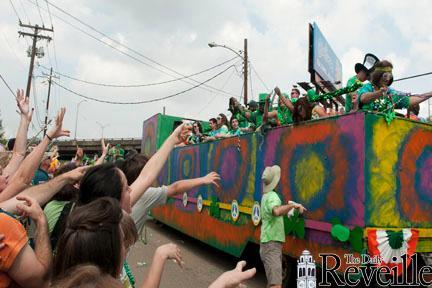If we’re all Irish on St. Patrick’s Day, I guess we can all go back to being American.
Which doesn’t cut it, does it?
Think of the times you’ve heard someone say, perhaps as a child, “I’m half French, half English and half Native American” – like a cultural man-bear-pig.
In actuality, to claim more than, say, three cultures or ethnicities is the equivalent of saying no culture at all. But we are American, right?
It’s a tough dilemma to claim ethnicity as an American, especially when abroad. To claim a handful would be misleading, as few Americans’ lives are affected by the numerous roots they hold, but to say you’re American doesn’t suffice.
I faced this dilemma when I was in Ireland.
Being in Ireland was a dream for me. After having traveled through a number of European countries, I had to accept the fact that the British Isles were the only place on Earth a redhead such as myself could blend in.
Donning a newsboy cap and letting my red curls hang, I could finally fit in somewhere that wasn’t America.
But the cultural dilemma found me on our last night in Dublin. My brother and I had been drinking heartily – stout, as one does when in Ireland.
The first time the heritage question arose was in a restroom: One Irishman, drunk as an American claiming to be Irish on St. Patty’s Day, asked from where in Ireland I hailed from. Flattered though I was, I told him I was American – to his disbelief. Flattered once more.
He proceeded to argue with me angrily about my being Irish, leaving me baffled as to how such a ridiculous argument could arise.
It must be noted that when drinking while surrounded by people with accents, one tends to pick up the tongue without noticing, and I was guilty of unearned inflection.
The drunken man’s weaselly Welsh friend – who would not stop ranting about “shagging” girls who weren’t Irish – had to bring my instigator home.
While finishing a nightcap with some locals, another man put the culture question forward.
“I love Americans, I really do, but it bothers me when Americans claim to be Irish,” he said.
Being inebriated, I was quick to reply that my brother and I were part Irish – surrendering my credibility in the process. “When you ask them how far back they go, or when their family emigrated,” he continued, “they know nothing.”
It’s true. I don’t know when the English part of my family left England, or when the Irish part left Ireland, or when the French left France or the Scottish left Scotland.
There are only two options when answering to your heritage abroad.
Either you do your research and tell the truth – typically accompanied by the caveat that heritage isn’t prominent in your life – or you say you’re American with a dash of what-have-you.
It’s a letdown, especially when in Europe where almost every citizen is rooted in his or her nationality. We Americans are left to our neo-culture of pluralism, business and politics.
To claim to be a melting pot and have strong cultural ties would be like eating the cake, too, so the best we can do is be aware of America’s place in the world and beg the foreigners to forgive our modernity.
At least until the next St. Patrick’s Day.
Clayton Crockett is a 20-year-old international studies sophomore from Lafayette. Follow him on Twitter @TDR_ccrockett.
—-
Contact Clayton Crockett at [email protected]
The New Frontiersman: St. Patrick’s Day sates Americans’ desire for culture, traditions
March 18, 2012








